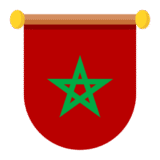Morocco Travel Tips for First-Timers
Imagine stepping into a world where African, Arab, and European influences blend in a vibrant tapestry of culture, architecture, and cuisine. Morocco, a fascinating destination, is becoming increasingly popular among adventurous travelers. With its bustling medinas, ancient kasbahs, stunning coastlines, and Sahara desert adventures, Morocco offers a diverse array of experiences that cater to all kinds of travelers.
For first-time visitors, Morocco can be both exhilarating and overwhelming. However, with proper preparation and insider knowledge, this incredible country can be an accessible and rewarding destination. Our comprehensive guide will walk you through everything you need to know, from cultural customs to transportation options, to make your Moroccan adventure memorable for all the right reasons.
Whether you’re planning a trip to explore the vibrant cities or seeking a tranquil escape, Morocco has something to offer. Get ready to embark on an unforgettable journey with our expert travel tips.
Planning Your First Trip to Morocco
As you prepare for your maiden voyage to Morocco, careful planning is key to making the most of your trip. Morocco is a country that seamlessly blends traditional and modern elements, offering a rich travel experience. From the bustling streets of Marrakech to the serene landscapes of the Sahara Desert, there’s much to explore.
Best Time to Visit Morocco
Morocco experiences distinct seasons, making the timing of your trip crucial. The ideal time to visit is during spring (March-May) and fall (September-November), when temperatures are pleasant across the country. Summer can be quite hot in inland cities like Marrakech and Fes, with temperatures often exceeding 100°F (38°C), while coastal areas like Essaouira remain more temperate.
How Long to Stay in Morocco
To truly experience Morocco’s highlights without rushing, a minimum stay of 7-10 days is recommended. This duration allows you to explore the country’s diverse regions without feeling hurried. For a more leisurely experience, consider spending up to two weeks or more exploring this fascinating destination.
Creating a Realistic Itinerary
Creating a balanced itinerary is essential for a satisfying travel experience in Morocco. For a 10-day trip, focus on 2-3 regions to avoid overpacking your schedule. Prioritize your interests, whether they be history, shopping, nature, or photography, to make the most of your trip. It’s also wise to plan your first night’s accommodation and transportation in detail, especially if you arrive after dark.
| Region | Duration | Highlights |
|---|---|---|
| Marrakech | 3-4 days | Explore the vibrant souks, visit the Bahia Palace, relax in a riad |
| Fes | 2-3 days | Discover the ancient medina, visit Al-Attarine Madrasa, enjoy traditional cuisine |
| Essaouira | 2-3 days | Relax on the beach, explore the ramparts, enjoy fresh seafood |
By planning ahead and being mindful of the time of year and your length of stay, you can create a memorable and enjoyable journey to this captivating place.
Essential Documents and Pre-Trip Preparations
A successful and enjoyable trip to Morocco starts with proper planning and documentation. Make sure you have all the necessary documents and arrangements in place before your departure.
Passport and Visa Requirements
Most visitors to Morocco need a passport valid for at least six months beyond their intended stay. Citizens of many Western countries, including the US, UK, EU, Canada, and Australia, can visit visa-free for up to 90 days. However, it’s essential to check the latest visa requirements before your trip.
Travel Insurance for Morocco
Comprehensive travel insurance is crucial for Morocco, covering medical emergencies, evacuation, and trip cancellation. Consider activities you plan to do, such as camel trekking or mountain hiking, and choose insurance that covers these adventures.
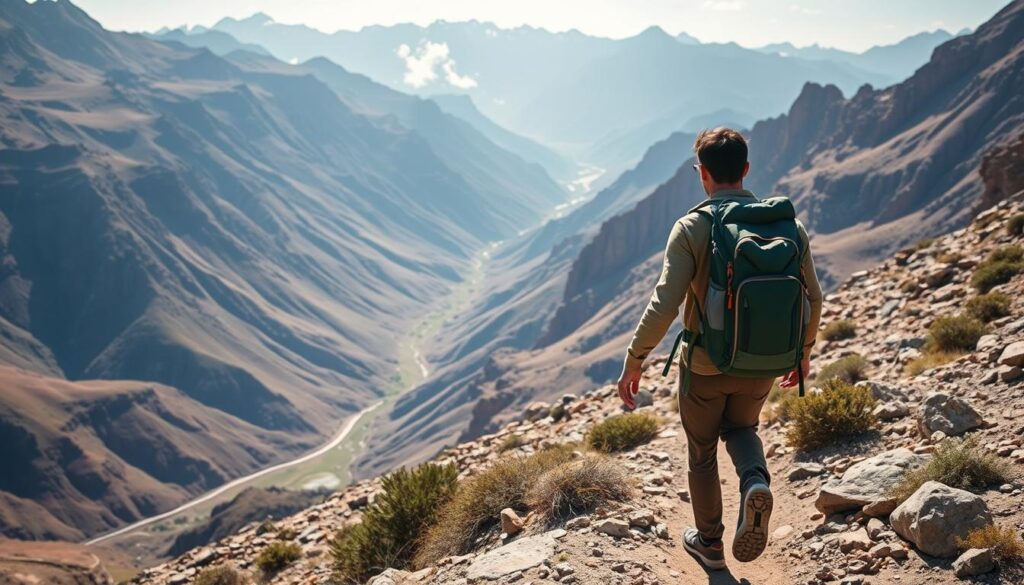
Important Documents to Photocopy
Photocopy your documents, including your passport, visa (if required), and travel insurance policy. Scan them and store digital copies in cloud storage. Keep physical copies separate from your originals. It’s also a good idea to carry a doctor’s letter for any prescription medications.
Money Matters in Morocco
When traveling to Morocco, understanding the local currency and payment methods is crucial for a smooth trip. Morocco has its unique financial landscape, and being prepared will help you navigate the country with ease.
Understanding the Moroccan Dirham
The Moroccan Dirham (MAD) is a closed currency, meaning it can only be obtained within Morocco and should be converted back before leaving the country. It’s essential to be aware of the current exchange rates and to exchange your money at banks or exchange offices in cities, as rates at airports and hotels are typically less favorable.
- The Moroccan Dirham is not easily exchangeable outside of Morocco, so it’s best to exchange your money upon arrival.
- Keep an eye on exchange rates to get the best deal.
Cash vs. Cards in Morocco
Morocco is still a predominantly cash-based society, especially in medinas, souks, and smaller towns, where credit cards may not be accepted. However, ATMs are readily available in major cities and tourist areas, although they can be scarce in rural regions.
It’s recommended to carry a mix of payment methods: cash for daily expenses and haggling in markets, and cards for hotels, upscale restaurants, and emergencies.
Notifying Your Bank Before Travel
Before you travel to Morocco, it’s crucial to notify your bank and credit card companies of your plans. This simple step can prevent your cards from being blocked due to suspicious activity. Additionally, inquire about any foreign transaction fees associated with your cards.
Tips for Safe Transactions:
- Check your bills carefully and count your change on the spot to avoid scams.
- Consider bringing a backup card from a different bank.
- Be aware of your surroundings when using ATMs.
Packing Tips for Morocco
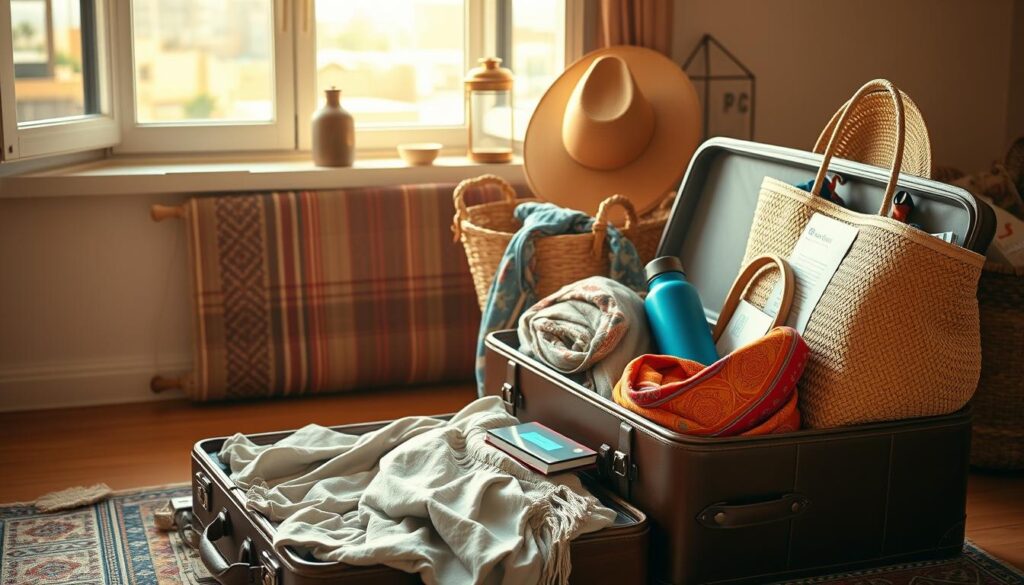
Packing for Morocco requires a thoughtful approach to ensure a comfortable and respectful journey. The key is to strike a balance between cultural sensitivity, comfort, and practicality.
Clothing Essentials for Cultural Respect
When it comes to clothing, modesty is crucial in Morocco, especially for women travelers. Loose, breathable fabrics that cover the shoulders, chest, and knees are recommended. Consider packing clothes that can be layered for varying temperatures throughout the day. A lightweight scarf can serve multiple purposes: as a head covering for mosque visits, sun protection, or evening warmth. Darker colors are preferable as they can be worn both day and night, and they hide dirt well.
It’s also a good idea to pack clothes that can do double duty, reducing the overall amount of luggage. Versatile items like a lightweight jacket or a dress that can be dressed up or down are excellent choices. Remember, the goal is to be respectful of local customs while also being prepared for the varying climate conditions.
Weather-Appropriate Gear
Morocco’s climate varies dramatically between seasons, regions, and even day and night. Understanding these variations is crucial for packing appropriately. Even in summer, visitors to the Atlas Mountains or desert nights will need warm layers. A seasonal packing guide can be helpful: for example, summer visitors should still pack a light jacket for cooler evenings, while winter travelers should include warm clothing for the cold mornings and nights.
Must-Have Items in Your Daypack
When exploring Morocco, it’s essential to have the right items in your daypack. Essentials include a water bottle, hand sanitizer, toilet paper/tissues, sunscreen, a hat, sunglasses, basic first aid supplies, and a power bank. Practical footwear is also crucial for navigating uneven medina streets, desert sand, and mountain terrain. Consider packing a small towel, travel laundry soap, and a clothesline for longer trips to reduce the amount of clothing needed.
Additionally, don’t forget to pack a change of clothes in your carry-on, along with any other essential items you may need if your luggage is lost or stolen, such as medication. Travel-size items can help save room in your luggage, making your journey more convenient.
Transportation in Morocco
Understanding the various transportation modes in Morocco is crucial for a smooth and enjoyable trip. Morocco offers a range of options to suit different travel needs and budgets.
Getting Around Moroccan Cities
Within Moroccan cities, you can get around using petit taxis (small, metered city taxis), grand taxis (larger, shared taxis for longer routes), and public buses. Navigating ancient medinas is often done on foot, while newer city sections are more accessible by taxi or bus.
Intercity Travel Options
For travel between cities, Morocco has a reliable train network connecting major cities like Casablanca, Rabat, Tangier, Fes, and Marrakech. You can book Morocco train tickets easily, choosing from various classes to suit your comfort and budget. Alternatively, CTM and Supratours buses cover routes not served by trains, while grand taxis are ideal for shorter intercity trips.
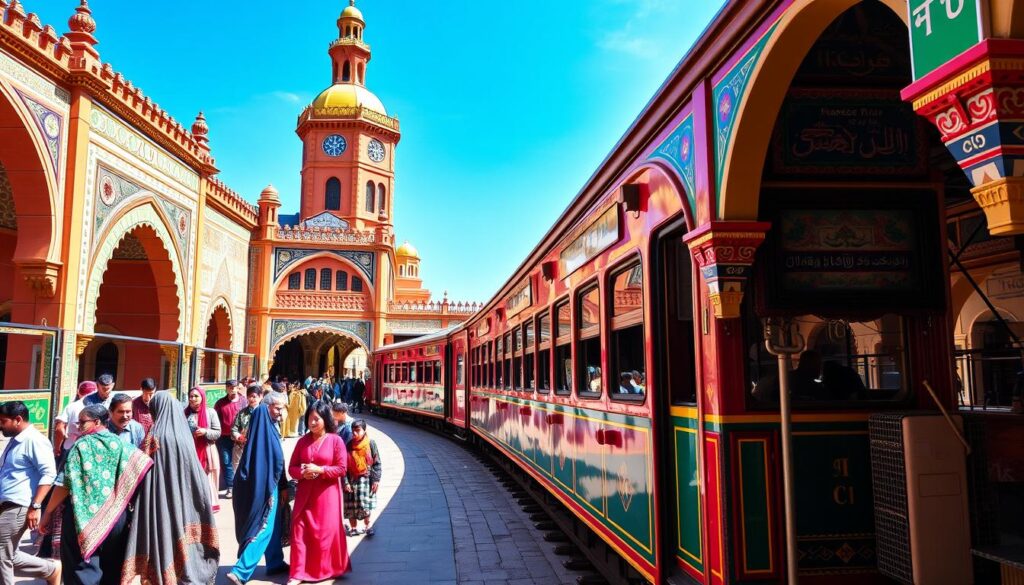
Taxi Tips and Negotiating Fares
When using taxis, it’s essential to agree on the price before you start your journey to avoid any disputes. Consider using apps like Uber, available in Casablanca, to simplify your travel experience. For longer trips or day excursions, hiring a private driver can be a convenient option, with reasonable price ranges varying depending on the distance and service.
One tip is to always negotiate the fare before you begin your journey. This simple step can save you from potential overcharging and ensure a smooth ride.
Morocco’s transportation system is designed to make traveling around the world – or at least within the country – relatively easy and accessible. By understanding your options and being prepared, you can enjoy a hassle-free journey.
Accommodation Options for Every Budget
Morocco offers a diverse range of accommodation options to suit every traveler’s budget and preference. Whether you’re looking for an authentic cultural experience, luxury, or something budget-friendly, you’ll find it here.
Authentic Riads and What to Expect
Riads are traditional Moroccan houses with interior courtyards that have been converted into guesthouses, offering a unique and authentic cultural experience. When staying in a riad, you can expect a central location within the medina, beautiful architectural details, and personalized service. However, be prepared for potential drawbacks such as no elevators, street noise, and sometimes shared bathrooms.
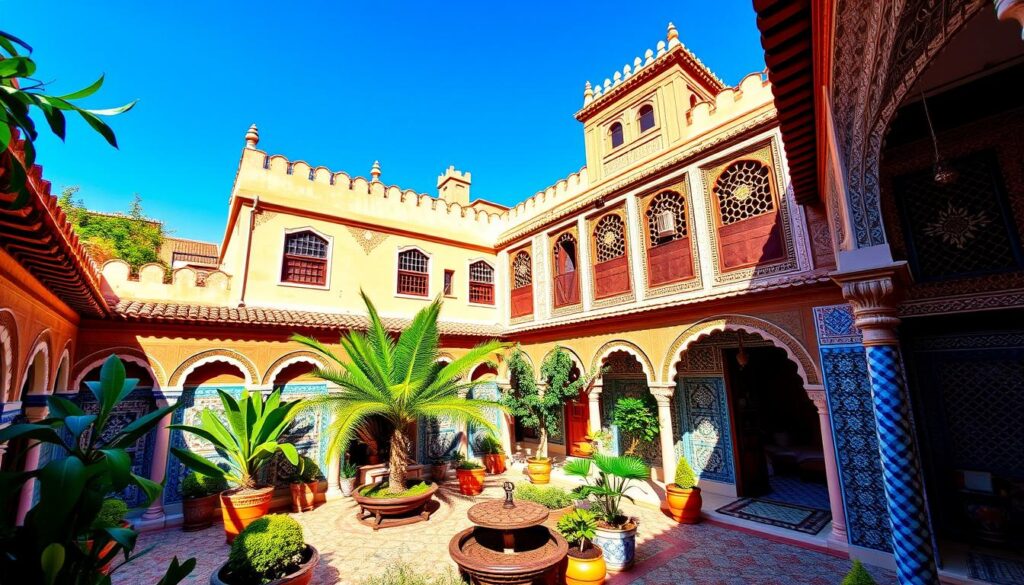
Hotels and Resorts in Morocco
Morocco is home to a wide range of international and local hotel chains, from luxury options like Four Seasons and Mandarin Oriental to mid-range choices. You can also find excellent resort options along the coast in places like Agadir and Essaouira, as well as desert luxury camps for a unique experience.
Budget-Friendly Hostels
Hostels are an emerging option in Morocco, particularly in cities like Marrakech, Fes, and Chefchaouen. They are ideal for solo travelers and those on tight budgets. Hostels are not only cheap but also organize events, making them a great place to meet fellow travelers. Plus, many hostel bars sell affordable beer.
It’s recommended to book your accommodation for the first few nights in advance, especially during high season, but leave some flexibility for the remainder of your trip. Consider the location carefully, as staying within the medina offers an immersive experience but comes with navigational challenges and noise.
Average price ranges vary significantly across these accommodation types. Riads and luxury hotels tend to be pricier, while hostels offer the most affordable nightly rates. Understanding these options and their associated costs can help you plan your trip to Morocco more effectively.
Cultural Etiquette and Customs
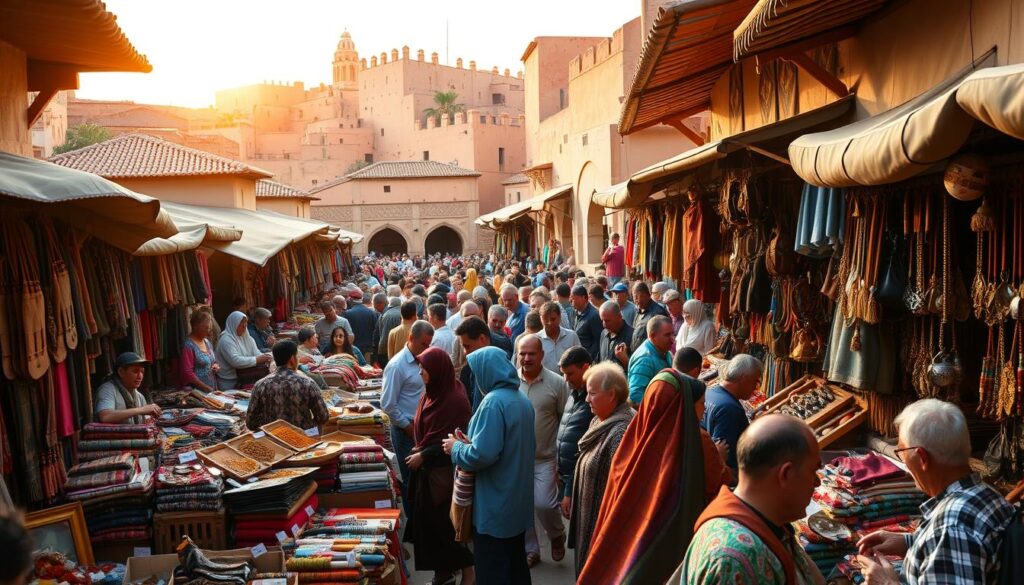
Understanding the cultural nuances of Morocco is crucial for a respectful and enjoyable trip. Morocco is a country with a rich cultural heritage, shaped by its history, geography, and religious practices. As a Muslim-majority country, daily life and social customs are significantly influenced by Islamic practices.
Respecting Religious Practices
Morocco’s status as a Muslim-majority country influences daily life, business hours, and social customs, especially during Ramadan. It’s essential to be respectful of religious practices. Most mosques are closed to non-Muslims, with exceptions like the Hassan II Mosque in Casablanca. During prayer times and religious holidays, visitors should be patient and respectful.
For instance, during Ramadan, the local population fasts from dawn to sunset. While tourists are not required to fast, they are expected to be considerate and not eat or drink in public during fasting hours. Understanding and respecting these practices will help you navigate Morocco with ease and make a positive impression on the locals.
Appropriate Dress Code
Dressing modestly is crucial in Morocco, especially in conservative areas. Both men and women should avoid revealing clothing. In cosmopolitan neighborhoods, the dress code is slightly more relaxed, but modesty is still appreciated. Visitors should be mindful of their attire when visiting mosques or rural areas.
Social Interactions with Locals
Social interactions in Morocco are characterized by warmth and hospitality. When greeting locals, a handshake or a kiss on the cheek is common. It’s customary to use your right hand when eating or giving/receiving items. When entering homes, removing your shoes is a sign of respect.
Learning basic Arabic or French phrases can enhance your interactions with the people of Morocco. Simple expressions like “Hello” (Marhaba), “Goodbye” (Ma’as salama), and “Thank you” (Shukraan) can go a long way in endearing yourself to the locals. Moroccans appreciate when visitors make an effort to communicate in their language.
Understanding the concept of hospitality in Moroccan culture is also vital. When invited for tea, it’s a sign of respect and friendship. Accepting such invitations graciously and being prepared to reciprocate the gesture can foster positive relationships with the locals.
Essential Travel Tips for Navigating Moroccan Souks
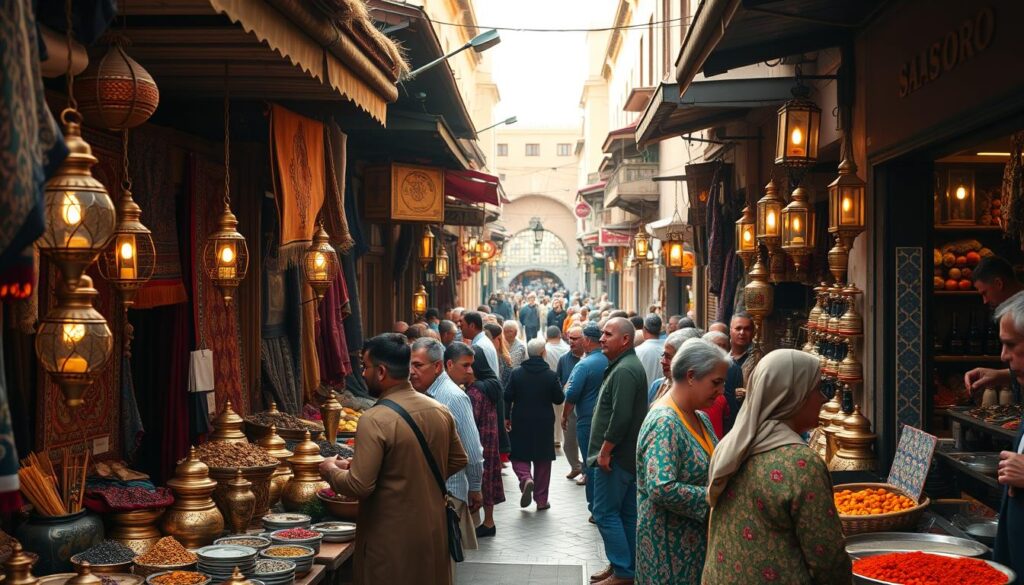
Moroccan souks are a labyrinthine shopping experience that requires some insider knowledge to navigate effectively. These traditional markets are central to Moroccan culture and a highlight for many visitors, offering a unique blend of culture, tradition, and commerce.
Bargaining Like a Pro
Bargaining is an expected social ritual in Moroccan souks, rather than a confrontation. To bargain effectively, start by offering 40-50% of the initial asking price. Maintain a friendly demeanor, and be willing to walk away if the price isn’t right. This approach will help you avoid overpaying and make the experience more enjoyable.
Learning to haggle is not just about getting a good deal; it’s an art that enhances your travel experience. It’s a fun, playful way of negotiating that will serve you well beyond your trip to Morocco.
Avoiding Common Tourist Scams
Tourists often fall prey to scams in Moroccan souks, such as being overcharged by “guides” or sold switched merchandise. To avoid these scams, be cautious of overly friendly locals who approach you with unsolicited offers. Always inspect goods carefully before purchasing, and be aware of the going rate for items you’re interested in.
Best Souvenirs to Bring Home
Morocco is renowned for its high-quality handicrafts, making it a shopper’s paradise. Some of the best things to bring home include handwoven rugs, leather goods from Fes, argan oil products, spices, ceramics, and metalwork. When making larger purchases, consider the price and the logistics of shipping items home. Understanding customs regulations, especially for food products, will help ensure a smooth journey.
Specific markets are known for particular goods, such as the carpet souks of Marrakech or the leather tanneries of Fes. Researching these markets beforehand can help you find the best souvenirs and travel tips for navigating them.
Food and Dining in Morocco
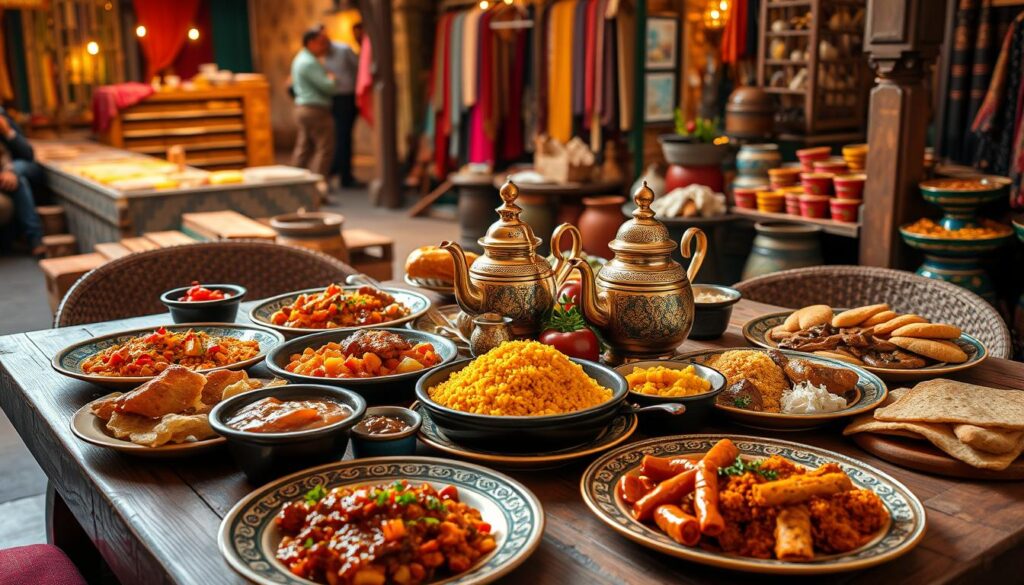
Moroccan cuisine is a rich tapestry of flavors, blending Berber, Arabic, Mediterranean, and French influences. This diverse culinary heritage is reflected in its creative use of spices, preserved lemons, olives, and dried fruits, making it a unique and exciting experience for visitors.
Must-Try Moroccan Dishes
For first-time visitors, Morocco offers a variety of dishes that are both flavorful and culturally significant. Tagine, a slow-cooked stew named after the earthenware pot in which it’s cooked, is a must-try. Other dishes include couscous, traditionally served on Fridays, pastilla (a savory-sweet pastry), and harira (a hearty soup). No meal is complete without a cup of mint tea, Morocco’s national drink.
Street Food Safety Tips
While exploring Morocco’s street food scene can be a thrilling experience, it’s essential to do so safely. Look for stalls with high turnover and freshly cooked items, and opt for places where locals are eating. Some safe and delicious options include freshly squeezed orange juice, msemen (flatbread), brochettes (grilled meat skewers), and harcha (semolina bread).
Dining Etiquette in Morocco
In traditional settings, Moroccans often eat communally from a central dish. It’s customary to use bread to scoop food with your right hand. Before meals, it’s polite to wash your hands, and during the meal, expressing appreciation for the food is considered courteous. When dining at local restaurants, especially those away from main tourist areas, you’ll often find better quality and value. Take advantage of lunch specials at expensive restaurants, as they offer the same dinner fare at a fraction of the cost.
Eating like a local in Morocco not only enhances your dining experience but also allows you to immerse yourself in the culture. By avoiding touristy areas and opting for where locals eat, you’ll discover the authentic flavors of Morocco. Additionally, considering the timing of your meals can make a difference, as lunch is typically the main meal, and dinner is served later than in many Western countries.
Staying Healthy and Safe
Ensuring your health and safety is paramount when traveling to Morocco, a country with its unique cultural and environmental challenges. To make the most of your trip, it’s crucial to be prepared.
Drinking Water and Food Safety
To minimize health risks, it’s essential to drink only bottled or purified water and avoid ice in drinks unless you’re at a high-end establishment. When it comes to food, opt for thoroughly cooked hot meals, peel fruits yourself, and be cautious with dairy products and raw vegetables.
- Drink bottled or purified water.
- Avoid ice unless at reputable establishments.
- Eat thoroughly cooked hot foods.
- Peel fruits and vegetables yourself.
Common Health Concerns
Travelers to Morocco may face health issues such as “Moroccan tummy” (traveler’s diarrhea), heat exhaustion during the summer, and potential altitude sickness in the Atlas Mountains. Packing essential medications like anti-diarrheal medication, oral rehydration salts, and pain relievers can help mitigate these risks.
Emergency Contacts and Medical Facilities
In case of an emergency, Morocco has good private clinics and hospitals in major cities, though facilities are limited in rural areas. Keep important numbers handy, such as 150 for police and 190 for an ambulance. It’s also wise to store your country’s embassy or consulate contact information. Comprehensive travel insurance that covers medical evacuation is crucial, as serious medical issues may require transport to larger cities or even Europe.
Communication Tips for Morocco
Morocco, with its diverse linguistic heritage, requires some preparation to navigate effectively. The country’s linguistic landscape is complex, with Arabic (specifically the Darija dialect) being the official language. Berber languages are also widely spoken, particularly in rural areas, while French serves as the language of business and government.
Language Basics to Know
Learning a few essential phrases in Arabic and French can go a long way in making your trip more enjoyable. Basic greetings like “hello” (مرحبا – Marhaba in Arabic) and “goodbye” (au revoir in French), as well as numbers and directions, can be very useful. For example, “thank you” is “شكرا” (Shukraan) in Arabic and “merci” in French.
Internet Access and SIM Cards
To stay connected, you have several options. You can purchase a local SIM card from providers like Maroc Telecom, Orange, or Inwi at the airport or authorized shops. The cost and coverage of data plans vary, but 4G is widely available in cities, although it can be spotty in remote areas. If you’re working while traveling, consider investing in a travel Wi-Fi hotspot.
Useful Translation Apps
For situations where you need more assistance, translation apps can be invaluable. Google Translate, with Arabic and French language packs downloaded, can work offline, helping you to communicate more effectively. Additionally, apps like WhatsApp and Messenger are popular in Morocco for staying in touch with locals or tour providers.
Most riads and hotels offer free Wi-Fi, though the speed and reliability can vary significantly. Being prepared with a local SIM card or a travel Wi-Fi hotspot can ensure you stay connected throughout your journey.
Top Destinations for First-Time Visitors
Morocco is a treasure trove of experiences, with several must-visit places that every first-time traveler should consider. From the bustling streets of Marrakech to the serene landscapes of Chefchaouen, each destination offers a unique glimpse into the country’s rich cultural heritage and natural beauty.
For a destination like Morocco, understanding the ideal time to visit and how to allocate your day is crucial. As a traveler, you want to make the most of your trip.
Marrakech Essentials
Marrakech is often the most popular entry point for first-time visitors, drawing travelers with its iconic Jemaa el-Fnaa square, the historic Koutoubia Mosque, and labyrinthine souks. Key experiences in Marrakech include visiting the Bahia Palace and El Badi Palace, exploring the Majorelle Garden, and taking a food tour through the medina. Allocating 3-4 days is recommended to fully absorb the city’s vibrant atmosphere.
Exploring Fes and Its Medina
Fes is Morocco’s cultural and spiritual capital, home to the world’s oldest university and the largest car-free urban area in the world. Highlights include the ancient tanneries, Al-Qarawiyyin Mosque and Library, and the intricate architecture of madrasas (Islamic schools). Spending 2-3 days in Fes allows you to explore its historical significance and architectural beauty.
Coastal Charm of Essaouira
Essaouira offers a laid-back coastal alternative to the busy inland cities, known for its Portuguese fortifications, thriving arts scene, and fresh seafood. It’s an ideal place to relax and enjoy the ocean breeze. Allocating 2 days is sufficient to soak in Essaouira’s charm.
The Blue City of Chefchaouen
Chefchaouen is renowned for its distinctive blue-washed buildings, relaxed atmosphere, and stunning setting in the Rif Mountains. This picturesque town is a perfect destination for those looking to unwind. Spending 2 days here can be a rejuvenating experience.
To make the most of your visit to these places, consider taking free walking tours available in major cities. These tours provide an excellent way to get oriented and learn about local history and culture, making your travel experience more enriching.
Day Trips and Excursions Worth Taking
While Morocco’s cities are a treasure trove of experiences, the real magic often lies in the day trips and excursions that take you beyond the urban landscape. These journeys offer a unique opportunity to explore Morocco’s diverse natural beauty and rich cultural heritage.
Sahara Desert Adventures
The Sahara Desert is one of Morocco’s most iconic landscapes, offering a range of excursion options from one-day trips to Zagora to multi-day journeys to the massive dunes of Erg Chebbi near Merzouga. When planning your desert tour, it’s essential to consider the time of year, what to pack, and how to choose a reputable operator.
To avoid disappointment, understand the concept of procurement when booking a tour. Procurement refers to the business terms of transactions, including who, how, and what you’re buying. Be wary of tour companies that seem too good to be true, as they may cut corners on safety or quality.
Atlas Mountains Exploration
The Atlas Mountains offer a range of experiences, including hiking opportunities in Toubkal National Park, visiting Berber villages, and exploring the Ourika Valley. When hiking, consider hiring a guide and necessary equipment to ensure a safe and enjoyable experience.
Visiting Berber Villages
Berber villages are an integral part of Morocco’s cultural heritage, offering a glimpse into traditional ways of life. Visitors can respectfully observe and participate in local customs, making for a rich and memorable experience. When visiting these villages, be sure to ask questions and show respect for local traditions.
When booking any excursion, it’s crucial to ask the right questions: What is the group size? What is the exact itinerary? What meals and accommodations are included? What reviews do past customers have? By doing your research, you can avoid overpriced tourist traps and suspiciously cheap options that may compromise on safety or quality.
Photography and Social Media Tips
Capturing the essence of Morocco through photography requires a blend of technical skill and cultural sensitivity. As you travel through this vibrant country, you’ll encounter numerous opportunities to take stunning photos, from the bustling streets of Marrakech to the serene landscapes of the Sahara Desert.
Etiquette for Photographing People
When photographing people in Morocco, it’s essential to be respectful of local customs. Always ask permission before taking someone’s picture, especially if they’re women or children. Some individuals may decline or request a small tip, as photographing people can be a sensitive topic due to religious or cultural beliefs. Being considerate of these feelings is crucial to having a positive interaction.
Tips for photographing people:
- Always ask for permission before taking a photo.
- Be prepared to offer a small tip if requested.
- Be respectful of those who decline to be photographed.
Best Photo Spots in Morocco
Morocco is filled with iconic locations that make for great photography. Some of the most popular spots include the blue streets of Chefchaouen, the sunrise over the Sahara dunes, the tanneries of Fes, and the colorful spice markets. For a more unique perspective, consider visiting less-photographed places like the cedar forests near Azrou, the Dades Valley, or capturing rooftop views across medinas at sunset. Timing is everything; try to visit popular sites early in the morning or late in the afternoon to avoid crowds and capture the best light.
By being mindful of the local culture and taking the time to understand the best places to visit, you can capture the beauty of Morocco in a way that is respectful and meaningful.
Common Mistakes First-Timers Make in Morocco
First-time visitors to Morocco often find themselves in tricky situations due to common mistakes that can be easily avoided. As a traveler, it’s essential to be aware of these potential pitfalls to make the most of your trip to this beautiful country.
Overpacking Your Itinerary
One of the most common mistakes is creating an overly ambitious itinerary that doesn’t account for the time needed to navigate Morocco’s transportation systems and sprawling medinas. To avoid travel fatigue, focus on fewer destinations with more time in each, allowing you to truly appreciate the culture.
Cultural Misunderstandings to Avoid
Cultural misunderstandings can lead to awkward or offensive situations. For example, dressing inappropriately, displaying public affection, or photographing people without permission can be considered rude. Understanding and respecting local customs is crucial for a harmonious travel experience.
Transportation Mishaps
Transportation mistakes can also cause significant inconvenience. Not agreeing on taxi fares before trips, misunderstanding train/bus schedules, and underestimating travel times between cities are common errors. To avoid these, research your transportation options in advance and plan accordingly.
Additionally, being mindful of your belongings and avoiding common tourist scams can make a significant difference in your trip. By being aware of these potential issues, you can ensure a smoother and more enjoyable experience in Morocco.
| Common Mistakes | Tips to Avoid |
|---|---|
| Overpacking Itinerary | Focus on fewer destinations with more time in each. |
| Cultural Misunderstandings | Respect local customs and dress appropriately. |
| Transportation Mishaps | Research transportation options and agree on fares before trips. |
Conclusion: Making the Most of Your Moroccan Adventure
As you step into the vibrant world of Morocco, the blend of tradition, culture, and natural beauty will captivate your senses and test your adaptability. Morocco is a country that promises to leave an indelible mark on your travel experience, with its rich tapestry of experiences waiting to be unraveled.
Throughout this guide, we’ve covered essential travel tips to ensure that your journey is both enjoyable and enriching. From understanding the importance of cultural etiquette to navigating the bustling souks, preparation is key. However, it’s equally important to remain open to the unexpected aspects of Moroccan culture and be willing to venture beyond your comfort zone.
Patience, flexibility, and a sense of humor are perhaps your most valuable assets when traveling in Morocco. These qualities will not only enhance your experience but also allow you to fully immerse yourself in the local way of life. Remember to leave some room in your itinerary for spontaneous discoveries and connections with the local people, as these often lead to the most memorable moments of your trip.
While Morocco can present challenges for first-time visitors, these challenges frequently result in the most rewarding experiences. To preserve the memories of your journey, consider keeping a travel journal or blog. We invite you to share your own Morocco travel tips and experiences in the comments section, helping to create a community of travelers who can learn from one another.
Morocco has a way of capturing travelers’ hearts, often leading to return visits. As you embark on your adventure, we wish you “Bssaha!” – a heartfelt Moroccan Arabic expression meaning “to your health,” used to wish someone a good journey or enjoyable experience. For further planning, explore additional resources on desert tours, hiking, and culinary experiences to enrich your trip to this captivating country.
As you return home, the memories of your time in Morocco will stay with you, a testament to the incredible experience you’ve had in this unique part of the world.
